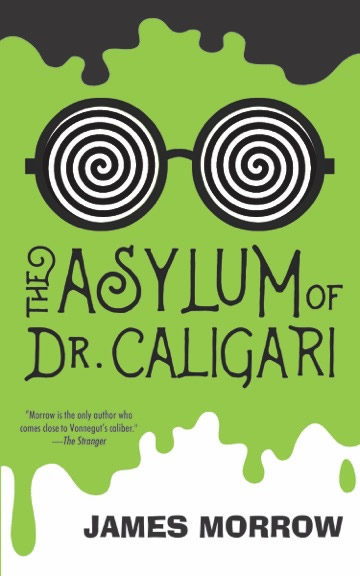Buy the Tree-Book, E-Book, or Audio Book at Amazon
Buy it at Barnes & Noble
Buy it at IndieBound
Buy it at AudioBooksNow
Buy the Audio CD’s at Tantor Audio
* * *
“Entrancing prose enhances the unusual plot of Morrow’s successful melding of history and fantasy … Readers with a taste for the bizarre and unexpected will be satisfied.”
“Morrow’s solid, colorful evocation of the era is matched only by his portraiture of the zany cast … I was particularly enamored of Ilona’s constant stream of spoonerisms and Carrollian wordplay, but she is not alone in turning out a neat phrase. Some of the dialogue assumes a Ballardian flavor of slightly askew non-sequiturs, gnomically issued … [The novella] succeeds in being at once a brilliant rendering of an antique spooky passion play and a timeless lesson about megalomaniacs, art, science and love.”
“A rich and wonderful mash-up of political satire, psychological fairytale and German Expressionist horror story, with a touch of sci-fi thrown in for good measure … There’s a gorgeous edge to Morrow’s writing, a sense of fun and irreverence that never detracts from the dark jeopardy at the heart of the story but which keeps the whole mad adventure chugging along … An unputdownable read, in all the best senses of that word.”
“In This is the Way the World Ends, Morrow suggests that the architects of nuclear death are guilty of entertaining the ‘bad ideas’ that, in the novel, facilitate Armageddon. Asylum in many ways makes the same accusation: that cynical war ‘profiteers’ like Caligari, the propagators of bad ideas, are culpable for their impacts, despite their denials. In an age in which warmongering hate-speech once more seems to have become almost acceptable, this is a charge we perhaps need to take very seriously indeed..”
“One of the joys of The Asylum of Dr. Caligari is its portrayal of the intellectual ferment of the first two decades of the twentieth century. Discussions of the value of the new science of psychology, of non-expressionistic art forms, of philosophers such as Nietzsche and of the evolution of warfare are strewn throughout the story. Despite the horrors depicted in the novel, it portrays the early 1900s as an exciting time to live.”
“The Asylum of Dr. Caligari is laugh out loud funny, even as it tosses about ideas surrounding perhaps our most serious and vile aspects of existence: war and indoctrination to war … The lexical precision, one perfectly placed word after another, can be enjoyed unto itself, even as it dissects the absurdity of war.”
“The often slapstick-tinged horror hides a deep and complex underbelly of philosophical exploration … If you aren’t interested in delving into the cerebral territory, there’s plenty of surface enjoyment to be had from the gothic horror tale.”
“James Morrow explores ideas with visionary audacity and a satirical (yet nonetheless disturbing) bent perhaps unequaled since Philip José Farmer’s Riverworld series—as if directed by Andrei Tarkovsky … Flinging love-darts at Freud, surrealism, Nietzsche (brilliant madman, or just plain mad?), Picasso, and the intrinsic (or not) value of art, Morrow pulls off that most difficult ‘trick’: humor rooted in sadness, particularly the type churning beneath history like a black river.”
““Morrow loves to play with language—several languages, really. The novel displays a gorgeously expansive vocabulary, double entendres, and a running joke involving the constant correction of Ilona’s meaningful malapropisms … This is an erudite, fun book that can be enjoyed on many levels; it succeeds as a satire of geopolitics and warmongering elites, as a comic fantasy, and as a pastiche of the 1920 film.”
“A deft little novel, The Asylum of Dr. Caligari is a perfect fit for people with an interest not just in fantasy but also in history, art, geography, and linguistics … This is less a fantasy novel in the usual modern sense than an allegory about war and the patriotic frenzy that inspires men to lay down their lives. The plot is an elegant scaffolding on which to hang the author’s gems of observation.”
“Comes under the same category … as Bruce Sterling’s splendidly off kilter Pirate Utopia … Both authors allow the strange to get stranger … never once losing control of the plot or where it is going. The two books should sit side by side on their own shelf, lest the energy radiating from them knocks the rest of your collection flying.”


